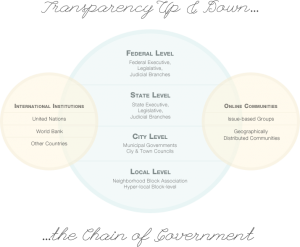 What a surprise to write this post this afternoon. If I hadn’t done my mindfulness practice this morning, I’d be tempted to post the cheesy Jerry Maguire “flip out” clip on a social media service, you know, as a lighthearted joke.
What a surprise to write this post this afternoon. If I hadn’t done my mindfulness practice this morning, I’d be tempted to post the cheesy Jerry Maguire “flip out” clip on a social media service, you know, as a lighthearted joke.
Friends at Sunlight: my offer stands, to maintain OpenCongress as a non-profit, open-source public resource, offering complementary info to GovTrack and OpenSecrets and others. Would welcome the chance to share our dev plans for publishing unique info in more detail.
OpenCongress was the focus of my professional life for more than six years, so of course upon seeing Sunlight’s decision today to retire it, I have to first regret the lost value – all the SEO of nine years, over 100 million visits, 200k+ registered users. And I have written pretty extensive thoughts on what’s still missing from the civic engagement landscape, even after all these years.
Rather, I’d like to emphasize that what made OC so successful can be replicated, better & smarter, and point to the open-source tools that our non-profit maintains for civic engagement. That’s the beauty – open-source lives on, our OC Blog content will hopefully live on, and there’s so much to do.
 OpenGovernment.org – based on the OpenCongress model – brings together official legislative data on the same page with campaign contribution info, issue group ratings, and public comments.
OpenGovernment.org – based on the OpenCongress model – brings together official legislative data on the same page with campaign contribution info, issue group ratings, and public comments.
One key function of OC that was deprecated after ’13 was foregrounding money-in-politics info, exactly on bill & member pages – where visitors landed to search for official info – hugely valuable info from OpenSecrets & MapLight reaching millions of people annually. In addition to the OC Wiki (RaceTracker), more of OC’s unique value: our daily OC Blog published custom summaries of hot bills and explained the legislative process through lobbying & issue areas.
People viscerally seek the real story behind what’s happening in Congress, and that means a huge demand persists for accessible info about how campaign contributions shape the boundaries of what’s legislatively possible (think big pharma, big banks, big defense, big oil). Understanding campaign donation data in real-world context is a general need that could be better served by non-profit sites. Help us reboot this open-source site and the GovKit gem, and we’ll pick up where OpenCongress is leaving off. See more about OG on our Projects page.

Our open-source GovKit Gem, powering OpenGovernment.org. Help us reboot this one-of-a-kind open-data resource.
AskThem – for continual conversation with elected officials and candidates, and open data on constituent communications. Public comments on OC bill pages (found via search engines) organically became peer-to-peer organizing forums – that’s made possible because we’re a non-profit, and our mission is to connect site visitors to the best available resources, not to capture their email for lead-gen revenue and fundraising. AskThem carries that goal forward, for continual discussion and accountability with people in power – in the 2016 federal elections, and especially in city governments, with unique access to data for 142,000 elected officials nationwide. We’ll help site visitors with similar questions connect with each other first, peer-to-peer, then organize between themselves second (e.g. on Action Network), introduce legislative text and schedule district meetings third, and then point to outside issue-relevant organizations fourth. It’s a pretty significantly different model than commercial engagement platforms that have so much capital.
X11 – PPF created the Contact Congress project in 2011, along with MyOC Groups – the first open-source tool for digitally transmitting a message through to Congressional webforms. It’s now been used to deliver hundreds of millions of messages through to Congressional webforms by dozens of advocacy groups (shouts EFF et al). Now, we can take that open-data advancement further – X11 is one name for a simple data standard for digital messages into Congress. If a government entity supports X11, an email or an e-petition can be delivered into an office, acknowledged, scheduled for a public response, analyzed for public knowledge, and shared socially at every step along the way. To be clear, civic-engagement platforms could immediately support this open standard, and gov’t could choose to accept it, but no one’s funded it, because shared infrastructure doesn’t offer a huge return on investment. But e-petitions and public questions can work just like 311 issues, and the benefits for open data and civic engagement would be massive. AskThem in particular can carry this standard forward – a question that reaches the threshold of support could be delivered with the X11 standard, and its receipt publicly acknowledged, while everyone who signed-on in support would be notified of its status. In the process, X11 can even turn Tweets and public Facebook posts into petition signatures, located in a government jurisdiction. Get in touch to help us spread X11 across our networks.
Councilmatic – for city government open data, legislative tracking, email alerts and local engagement. The only non-profit site with info on every city legislative item, council member, committee, public event and more. Open-source as always, so local groups can stand it up and remix it without anyone’s permission. Also built on the Open Civic Data standard, so more engagement and alert apps can re-use this open data and spread from city to city. Next: alerts, over email and social media, so it’s easy to stay in touch with what’s on the agenda in your city and how it affects your neighborhood and the issues you care about locally.

At the Feb. 2007 launch of OpenCongress. Coming up on ten years in the game. I was optimistic about open-source, non-profit tech.
Here’s the deal. We’re a tiny 501(c)3 non-profit (annual budget: just $75,000, probably about two percent of Sunlight’s, less than one full-time employee). We make hugely popular web resources for “interested bystanders†and issue activists, filling a need for open infrastructure for civic participation and closing the feedback loop of local engagement.
But we don’t have core funding support, full-time project funding, major philanthropic donors, regular earned-income revenue, a wealthy Board or a fundraising Advisory Council. So we seek charitable funding to maintain open-source, open-data resources such as Councilmatic, used by thousands of people in each city where it’s up every month. Supporting our proven, popular work with a charitable donation can make the projects above happen, open-source and for the public benefit– we have virtually no overhead, so your tax-exempt donation goes to the project. Just doing the open work. Get in touch, email me: david at ppolitics.org.